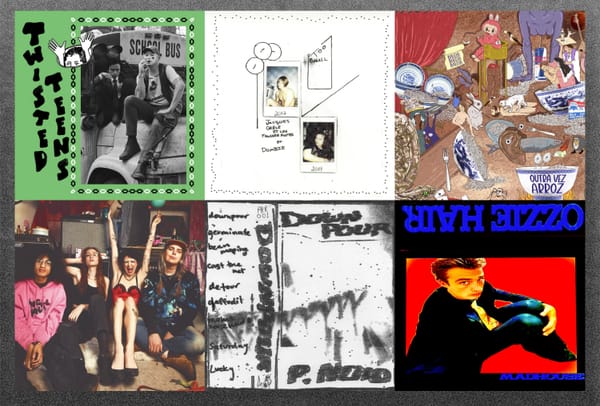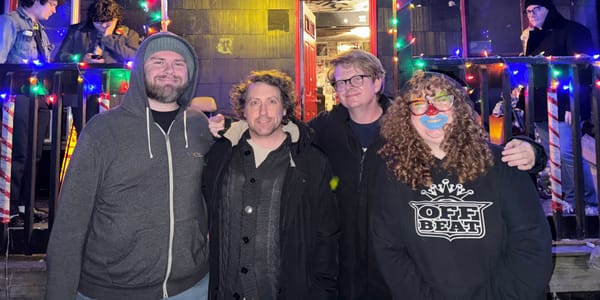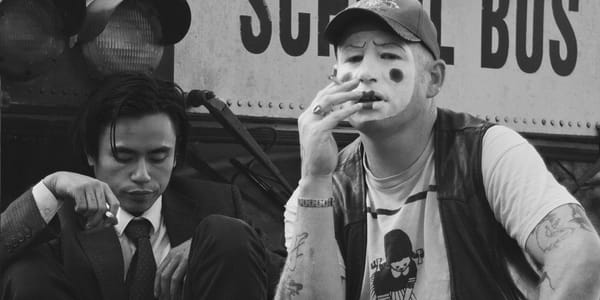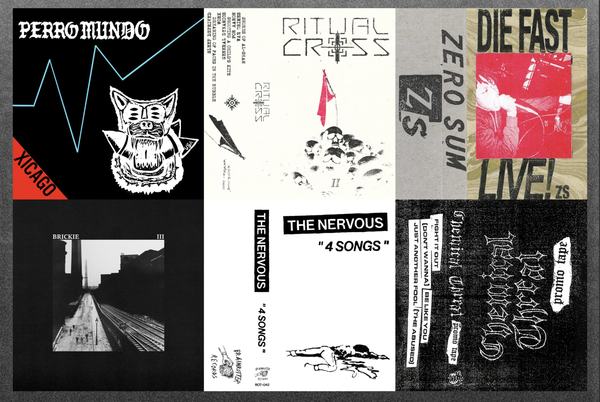wesley and the boys are the best memphis band from nashville
The prolific rock’n’roll crew on the state of Tennessee’s scenes, punk house horrors, and fighting on the internet.
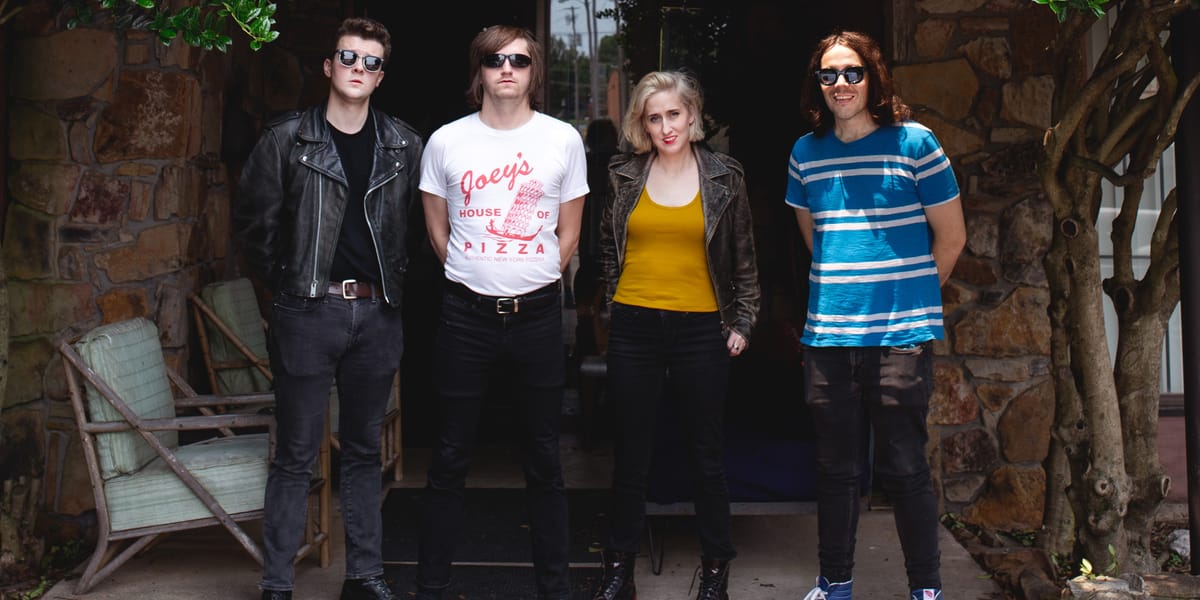
The handshake between the Midsouth, Midwest, and Rust Belt is one of the country’s best kept rock’n’roll secrets. Years of being cast aside as the “flyover” region has resulted in punks up and down the Mississippi River banding together to create their own cross-regional scene. Nashville garage rockers Wesley and the Boys have found themselves at the center of that creative whirlwind, honing their live show while spreading the gospel of their home city across state lines and all the way to the West Coast.
I met up with the band at Memphis’ Easley-McCain studios, where they recorded a handful of tracks for their sophomore record from earlier this year, Rock & Roll Ruined My Life. They’re in town to play What’s For Breakfest, a festival organized by one of the crucial record labels documenting the “Flyover State” scene. The festival packs a whopping 22 bands in two days, including my band Big Clown playing a set at 12:30 a.m. the previous night. Wesley and the Boys played around 12 hours after our interview and blew the roof off the Lamplighter Lounge.
Before then, I caught up with Wesley, Jonny, Ashton, and Joey about their new record, the Nashville scene, and getting into fights on the internet. They’re playing Gonerfest later this year, and Wesley has already finished the demos for the next album. “I think it’s far and away the best thing I’ve ever made.”
Wesley and the Boys started as a solo project, right?
Wesley: It was born out of being new to Nashville and not knowing anybody to play with. I had a lot of stuff on a 4-track recorder that I compiled over the years. The first Wesley and the Boys album was just a 4-track dump. It was just a means to an end with people in Nashville. When you go out and meet folks and try to get involved with music, they’re like “do you have a Spotify I can listen to?” If you don’t, the culture in Nashville is like “you’re just another one of those delusional people that moved here.” I went to a party one night with a guy and we talked about music for three hours. It was a really good conversation and I was like “send me your music.” His music was actually just him singing his own lyrics over Strokes backing tracks. I felt so duped.
Speaking of Nashville, I can’t help but notice that you guys are basically a Memphis local band at this point
Wesley: One of my favorite compliments that I’ve heard people say is that we’re the best Memphis band from Nashville.
You fit in so well here. I think Rock & Roll Ruined My Life reflects that too, because it was recorded in Memphis and Nashville, right?
Wesley: The three songs from the LP that were also on the “Switchblade Twist” 7” were all recorded at Easley-McCain with Matt Qualls.
Jonny: We played our very first Memphis show at the Lamplighter with Opposums and the Wirms. The day after, before we had to drive back to Nashville, we recorded all of those songs in four hours. It was quick.
Where’d you record the stuff in Nashville?
Jonny: At my house.
Those recordings are pretty old too, right?
Wesley: I think we tracked them in May 2023, so it’s been just around two years.
Jonny: It wasn’t exactly a painful birth, but definitely an elongated one. It was done for a year and some change before it came out. I’m just an endless tinkerer and Wesley was able to be very patient with me.
Wesley: There’s those bands you think of where they tinker with everything forever and they end up fucking the record up. I feel like we’re a rare band where it’s actually better the longer we tinker with shit. It’s not really in my nature to do that, but Jonny’s turned me onto his ways to do that a little more.
One thing I really like about y’all is that you’re easily categorizable as a garage rock band, but when you dig through the record, it oscillates between styles pretty frequently. You’ve got the West Coast thing going on “Somebody Help Me,” “Spy” is a little more egg punk, etc. What drives that for you?
Wesley: There are bands where they’re really this fucked up spaghetti of the stuff they like. It’s a little more concerted than that. There’s a strategy. I just like a lot of kinds of music within punk and rock’n’roll. I try to stay relevant. I meet a lot of older mohawk punks that have this attitude towards knowing about music where it’s like “oh, I don’t know what that is [fake sarcastic laugh]. Let me be a chucklefuck about the whole thing. Ignorance is bliss!” I dunno. It’s the same thing as 40-year-old dads in the year 2000 being like “I don’t know who Britney Spears is.”
Jonny: I feel like every venue we went to on the West Coast had ten 45-year-old bummed out punks [in attendance] all wearing the same leather jacket. I hadn’t noticed it until we left and Joey was like, “man, every venue we played on the tour has the most sad name.” Like No Fun Bar. Bleak Outlook. Slim’s Last Chance. Everywhere was just like “this place sucks.”
Another way you bridge the gap between a lot of these micro-styles on the album is in the mixing. The mixing is different from song to song, but it has this unifying crunchy, bass-heavy sound to it.
Wesley: As someone who really loves music that sounds sonically bad, we actively tried to make our record sound good. I have the fight with myself where Jonny wants to soup it up and make it sound nice, but my natural inclination is “no, let’s fucking run it over.”
Jonny: On a lot of older punk records, there’s no presence in the low end. If the record surpasses a half hour, it gets fatiguing to only hear cymbals and guitars. We wanted to make a record where the mixing makes it modern in that way.
Wesley: There’s no ignorance here; we are conscious of what we’re doing. There’s some bands where they make a record that’s recorded shitty, and it sounds good, but there’s not any sort of genius thing they’re doing. They just don’t know how to do it any other way. There’s a beauty in that, of course, but with us, we know exactly what it is we’re doing.
Who have y’all seen at Breakfest so far and who are you excited to see?
Jonny: I know I’ve seen them seven or eight times at this point and they’re our tiki rock’n’roll brothers, but I’m always stoked to see Nightfreak. They do the band thing so right. They’re such brothers, it warms my heart to see them onstage.
Wesley: I always go back to the old saying, I think it was Johnny Ramone that said it, that your band should be like a gang. They definitely got that down.
Jonny: We try to take a page out of that book.
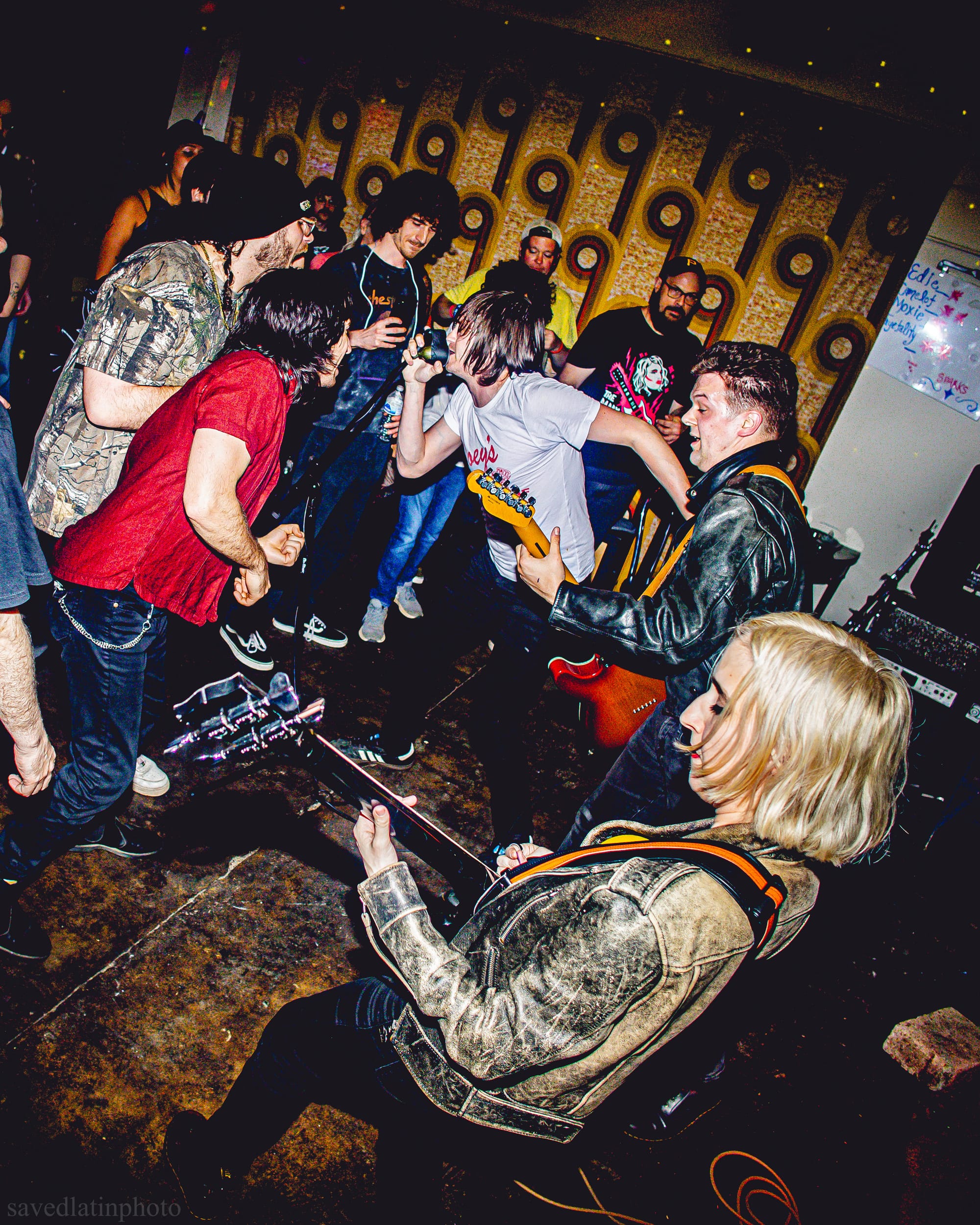
I feel like the Midsouth/Midwest/Rust Belt punk connection right now is really strong.
Wesley: I think the rest of the country has places where there’s literally nothing fucking happening or places where it’s too expensive to exist as an artist. I feel like the South/Rust Belt/Midwest is the last real large body of area that’s not too expensive to be an artist.
Jonny: Nashville is one of the most central cities in the sense that we can go two and a half hours in any direction and hit another city. That connection—they scratch our back and we scratch their back—stretches all the way up to Green Bay.
Ashton: That’s what I love most about all of this: You get to build relationships with people. I don’t care about how good of a musician you are or how good of a band you are if you’re a shitty person. The community is the only way that this happens.
Jonny: There’s so many good bands in Nashville right now. It feels like it’s taking shape in its own special way.
Where is the Nashville scene right now?
Wesley: The scene is small but mighty. I can think of six or seven bands that are really good. I always joke with the guys in those bands, like “now we need a bunch of shitty rock and roll bands to start!”
Ashton: I think a lot of people skip over Nashville because there’s a perception that their band can’t find a bill that works. That’s not the case. There’s more that I think flies under the radar that deserves extra credit.
Jonny: I think Nashville gets its well earned industry reputation. Like, that’s the industry guy in the back with his arms folded, they’re gonna see the band they want and then they’ll leave. We’ve experienced our fair share of that.
I’m gonna do a lightning round on your songs, starting with “Jail, Again.” Have any of you ever actually been to jail?
Wesley and Joey, simultaneously: Yeah.
Woah, I didn’t expect two. Do you wanna talk about it?
Joey: No.
I kinda forgot that it’s “Again,” which does imply the existence of at least one prior jail sentence.
Wesley: I don’t know why I got arrested so much when I was younger.
Ashton and Jonny, simultaneously: You know why.
Wesley: …Yeah. [everyone laughs]
“Car Song.” How do you feel about driving? This feels like a real ode to driving to me, and personally I love driving.
Wesley: I love driving but I also like drinking. Those two things don’t go super good.
Is “Alano Club” about a place you rented for $190?
Wesley: It was this really weird punk warehouse in downtown Tacoma, Washington. I went there when I was 16 years old with a friend. We had heard about it and were like “we gotta check it out, it’s so gnarly.” We were kids just sneaking up on the boogeyman’s house. We rolled up to the Alano, first time I’d ever seen it, and when I knocked on the door, a naked girl answered it. There was a shitload of naked people there having a certain kind of party. We’re just standing there, mouth agape. The people in the Alano didn’t really know what to expect either, because, if you’re knocking on the door, you’re probably one of the people who wanna come inside and get naked. They open the door and it’s a couple of kids, so they’re just like “oh, shit” [laughs]. Me and my buddy were mortified and walked off.
Fast forward three or four years later and me and my best friend from high school went to a show at the Alano. Someone there was like “there’s two people moving out this month, do you guys wanna move in?” We moved into the Alano and lived there for four months. We threw three or four punk rock shows a week. It was a crazy, cool place. When you walked in the front, there would be couches stacked on top of couches six high. I would hang out on the top couch and smoke weed and eat cereal in the morning. This kid who moved out so we could move in had a Ruckus scooter and he’d bust the door down with his bike at 8:30 in the morning. He did donuts in the living room. He would also blow up our toilet with explosives and was in general a really, really scary person.
I love the song “Fight on the Internet,” mostly because I’ve gotten into many fights on the internet and will continue to do so in the future. Was there a specific fight that sparked that for you?
Wesley: There wasn’t, no. I was just having fun on this one. It’s definitely about millennial Facebook fight culture.
Jonny: It’s such an overly bombastic, in the streets, “I’m gonna sock you in the mouth” type song and it’s just like “this person posted what? I’m gonna [punches his hand].”
I can’t help but think about the horrible serendipity of this song.
Wesley: [laughs] I was hoping you’d bring this up.
It came out at almost the same time as the only modern punk fight on the internet.
Wesley: Are you making reference to the great egg punk manifesto of 2025?
I am. It came out the day before the album dropped.
Wesley: I don’t know what they’re teaching kids in school these days. I’m gonna be personally pissed off if the great egg punk manifesto and the great battle that ensued don’t make their way into the kids’ history textbooks. It’s important stuff.
I know you have a vested interest here, because there’s a Wesley and the Boys egg punk album that I personally love. I can't help but think: Internet Punk, “Fight on the Internet,” it’s all related.
Wesley: It’s definitely a tongue-in-cheek thing. It wasn’t originally planned to be a Wesley and the Boys release. We had just tracked the album and all of a sudden I was like “OK, now I have a whole lot of time to do something else.” I started doing all these home recordings and the initial plan was to make it be a side project, but managing personalities and starting a band is such a daunting task. Upon finishing it and listening through it a couple of times, I was like “why can’t this be us?” I told myself “man, you hate when bands are overly repetitive and make the same record over and over again. You wanna throw people for a fucking loop? You wanna keep people on their toes? Here’s your chance to do it.”
I had listened to a lot of egg punk and enjoyed it. I didn’t think that we, perceptively, were an egg punk band, but wouldn’t it be funny to throw our hat in the ring and say, “look, we can do it too and you guys are a bunch of dorks.” The second track on that album [“The Ballad of Super Weenie Hut Jr.”] is about a venue I went to in Nashville where I got in trouble for moshing at a punk show. I was feeling bullied for not being enough of a weirdo, I guess.
Ashton: Not fitting in. That’s a theme you’ll see through the album as well.
Zach Mitchell is a Memphis artist who plays in the band Big Clown. He runs the VHS and cassette label Machine Duplication Recordings.
If you enjoyed this article, please consider subscribing to see/saw, a reader-supported punk + rock'n'roll newsletter.

